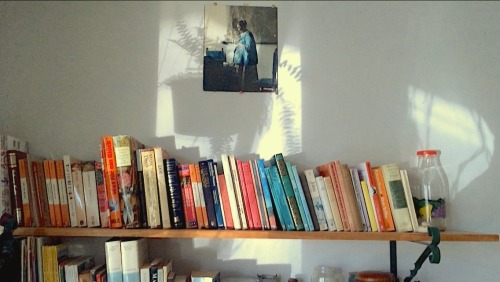Csmsdust




More Posts from Csmsdust and Others
“Imagine what it would look like if ChatGPT were a lossless algorithm. If that were the case, it would always answer questions by providing a verbatim quote from a relevant Web page. We would probably regard the software as only a slight improvement over a conventional search engine, and be less impressed by it. The fact that ChatGPT rephrases material from the Web instead of quoting it word for word makes it seem like a student expressing ideas in her own words, rather than simply regurgitating what she’s read; it creates the illusion that ChatGPT understands the material. In human students, rote memorization isn’t an indicator of genuine learning, so ChatGPT’s inability to produce exact quotes from Web pages is precisely what makes us think that it has learned something. When we’re dealing with sequences of words, lossy compression looks smarter than lossless compression.”
— Ted Chiang’s essay about ChatGPT is required reading

i miss these kinds of visuals for websites. RIP




cestum veneris


Surface display of the various structures that play a role in either coloring (e.g. valence circuits) or encoding (interoceptive and cognitive circuits) emotional awareness states source

The books I'm reading at the moment.

Meditations by Marcus Aurelius - I love this book. It puts you in the perspective of the time and space you occupy, I found a lot of my own thinking and feelings within the pages of this book. A guy born in AD 121 has very clear view on life that is still relevant today.

Great Adaptations by Kenneth Catania - A professor of biological sciences takes you on a journey with him while he studies various animals adaptive abilities. Star nosed moles, electric eels, tentacled snakes... Very interesting insight in how these creatures evolved and adapted.

What we cannot know by Marcus du Sautoy - Explains concepts from the ground up, I like the illustrations that accompany the text and practical examples. Lays foundations to the known and wonders into the future of research and the possibilities that come with it as well as limitations. Covering themes from quantum physics and cosmology to sensory perception and neuroscience.

Labyrinths of reason by William Poundstone - "Blue sky, sunshine, deja vu glazed with dread." How do you know this isn't all a dream? Is anything certain? Ontology, logic, mathematics, deduction, epistemology, memory formation, paradoxes and puzzles.

A brain for numbers by Andreas Nieder - Humans' understanding of numbers is intuitive. How are infants able to perceive numbers even before they learn the words for them? How do our brains process numbers? Can animals count? He shows how it is an adaptive ability and that plenty of animals have the number sense too. There is a variety of research and supporting evidence mentioned which I really like.
-
 friendly-neighborhood-freak reblogged this · 3 weeks ago
friendly-neighborhood-freak reblogged this · 3 weeks ago -
 friendly-neighborhood-freak liked this · 3 weeks ago
friendly-neighborhood-freak liked this · 3 weeks ago -
 blaneroses liked this · 2 months ago
blaneroses liked this · 2 months ago -
 maximumeaglethingranch liked this · 3 months ago
maximumeaglethingranch liked this · 3 months ago -
 llevotuvozenmivoz-meow reblogged this · 5 months ago
llevotuvozenmivoz-meow reblogged this · 5 months ago -
 llevotuvozenmivoz-meow liked this · 5 months ago
llevotuvozenmivoz-meow liked this · 5 months ago -
 krymiki reblogged this · 5 months ago
krymiki reblogged this · 5 months ago -
 worldspins-madlyon reblogged this · 5 months ago
worldspins-madlyon reblogged this · 5 months ago -
 rolandiaz7 liked this · 5 months ago
rolandiaz7 liked this · 5 months ago -
 21whynots reblogged this · 5 months ago
21whynots reblogged this · 5 months ago -
 narcissismand reblogged this · 5 months ago
narcissismand reblogged this · 5 months ago -
 absstpoetry liked this · 5 months ago
absstpoetry liked this · 5 months ago -
 gracellynh liked this · 5 months ago
gracellynh liked this · 5 months ago -
 marvelmyles reblogged this · 5 months ago
marvelmyles reblogged this · 5 months ago -
 khlomariee reblogged this · 5 months ago
khlomariee reblogged this · 5 months ago -
 justlayinmyroom reblogged this · 5 months ago
justlayinmyroom reblogged this · 5 months ago -
 harrietinthesky reblogged this · 5 months ago
harrietinthesky reblogged this · 5 months ago -
 intoxicatingbullshit reblogged this · 5 months ago
intoxicatingbullshit reblogged this · 5 months ago -
 ma-ze reblogged this · 5 months ago
ma-ze reblogged this · 5 months ago -
 2amfaded reblogged this · 5 months ago
2amfaded reblogged this · 5 months ago -
 21whynots reblogged this · 5 months ago
21whynots reblogged this · 5 months ago -
 ddolcerose liked this · 5 months ago
ddolcerose liked this · 5 months ago -
 gh0stllyy liked this · 5 months ago
gh0stllyy liked this · 5 months ago -
 dizzy-izzy23 reblogged this · 5 months ago
dizzy-izzy23 reblogged this · 5 months ago -
 rosy-coco liked this · 5 months ago
rosy-coco liked this · 5 months ago -
 crevecoeur3 reblogged this · 5 months ago
crevecoeur3 reblogged this · 5 months ago -
 xxdreamoutloud44 reblogged this · 5 months ago
xxdreamoutloud44 reblogged this · 5 months ago -
 euphoric-state reblogged this · 5 months ago
euphoric-state reblogged this · 5 months ago -
 lotosblumee reblogged this · 5 months ago
lotosblumee reblogged this · 5 months ago -
 deadlysyndrome liked this · 5 months ago
deadlysyndrome liked this · 5 months ago -
 aforyouu reblogged this · 5 months ago
aforyouu reblogged this · 5 months ago -
 suspend reblogged this · 5 months ago
suspend reblogged this · 5 months ago -
 s-tress-ful reblogged this · 5 months ago
s-tress-ful reblogged this · 5 months ago -
 s-tress-ful liked this · 5 months ago
s-tress-ful liked this · 5 months ago -
 sihlouete reblogged this · 5 months ago
sihlouete reblogged this · 5 months ago -
 fearlesshine reblogged this · 6 months ago
fearlesshine reblogged this · 6 months ago -
 atticus-arden reblogged this · 6 months ago
atticus-arden reblogged this · 6 months ago -
 moonxmai reblogged this · 6 months ago
moonxmai reblogged this · 6 months ago -
 less-sad liked this · 7 months ago
less-sad liked this · 7 months ago -
 les-cris-des-fendues liked this · 8 months ago
les-cris-des-fendues liked this · 8 months ago -
 raspbrrytea liked this · 8 months ago
raspbrrytea liked this · 8 months ago -
 deadtothebones reblogged this · 8 months ago
deadtothebones reblogged this · 8 months ago -
 deadtothebones liked this · 8 months ago
deadtothebones liked this · 8 months ago -
 meltedfuckingmarshmallow reblogged this · 8 months ago
meltedfuckingmarshmallow reblogged this · 8 months ago -
 manila-custard reblogged this · 8 months ago
manila-custard reblogged this · 8 months ago -
 scarlettdixon liked this · 8 months ago
scarlettdixon liked this · 8 months ago


